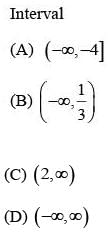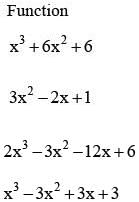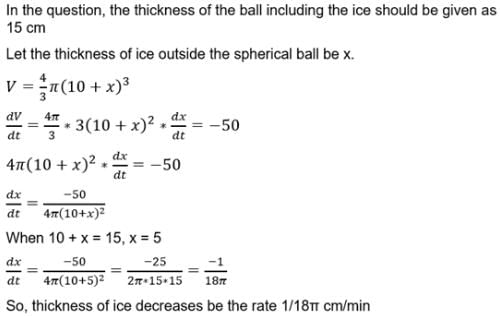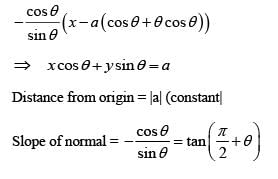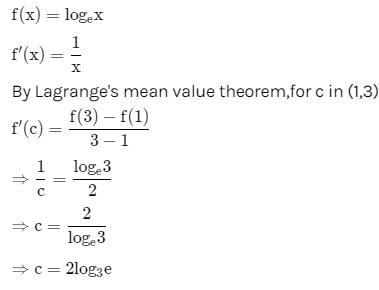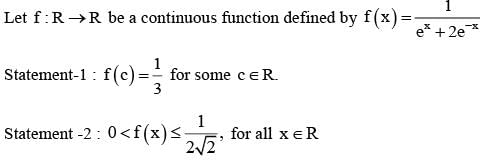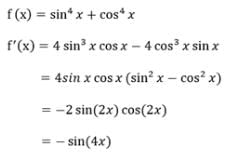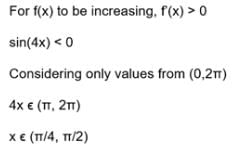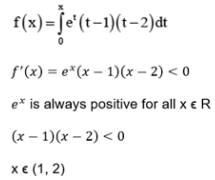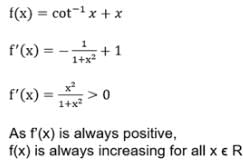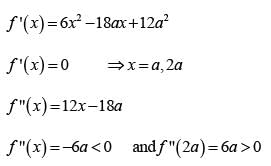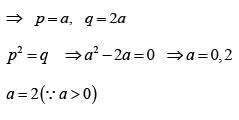JEE Advanced Level Test: Applications of Derivatives - JEE MCQ
30 Questions MCQ Test - JEE Advanced Level Test: Applications of Derivatives
A spherical iron ball 10 cm in radius is coated with a layer of ice of uniform thickness that melts at a rate of 50 cm³/min. When the thickness of ice is 15 cm, then the rate at which the thickness of ice decreases, is
Area of the greatest rectangle that can be inscribed in the ellipse  is
is
Let f(x) be differentiable for all x. If f (1) =-2 and f '(x)³ ≥2 x ∈ (1/6) then
The normal to the curve x = a ( cos θ + θ sin θ) , y = a (sin θ - θ cos θ) at any point ' θ' is such that
The function f (x) = x/2+2/x has a local minimum at
A value of c for which the conclusion of Mean value Theorem holds for the function f ( x ) = loge x on the interval [1, 3] is
The function f ( x ) = tan-1 (sin x cos x) is an increasing function in
Suppose the cubic x3 - px + q = 0 has three distinct real roots where p > 0 and q > 0. Then, which one of the following holds?
The shortest distance between the line y - x= 1 and the curve x =y2 is
Given p ( x ) = x 4 + ax3 + bx 2 + cx + d such that x =0 is the only real root of p ' ( x ) = 0 .
If p ( -1) < p (1) , then in the interval [-1,1]
The equation of the tangent to the curve y= x+4/x2 that is parallel to the x-axis is
Let be defined by
If f has a local minimum at x = - 1, then a possible value of k is
The normal to the curve x2 + 2xy - 3y2 = 0 at 1,1
Consider the function, f ( x ) =| x - 2 | + | x - 5 | .x∈ R
Statement -1 : f ' ( 4) = 0
Statement -2 : f is continous in [2, 5], differentiable in (2, 5) and f ( 2) = f ( 5)
A spherical balloon is filled with 4500 π cubic meters of helium gas. If a leak in the balloon causes the gas to escape at the rate of 75 π cubic meters per minute, then the rate (in metres per minute) at which the radius of the balloon decreases 49 minutes after the leakage began is
Let a, b ∈ R be such that the function f given by f ( x ) = In | x | +bx 2 + ax, x ≠ 0 has extreme values at x =-1 and x = 2.
Statement – 1: f has local maximum at x = - 1 and at x = 2.
Statement-2 : a=1/2 and =-1/4
The real number k for which the equation, 2x3 + 3x + k = 0 has two distinct real roots in [0, 1]
The function f ( x ) = sin4 x+ cos4 x is increasing if
Let dt then f decreasing in the interval
The two curves x3 - 3xy2 + 2 = 0 and 3x 2 y - y3 - 2 = 0
The greatest value of f (x) = (x + 1)1/3 - (x - 1)1/3 on [0, 1] is
The function f ( x ) = cot -1 x+ x increases in the interval
The real number x (x > 0) when added to its reciprocal gives the minimum sum at x equals
If the function f ( x ) = 2x3 - 9ax2 + 12a 2x + 1, where a >0 , attains its maximum and minimum at p and q respectively such that p² = q, then 'a' equals
If 2a + 3b + 6c = 0, then at least one root of the equation ax 2 + bx + c = 0 lies in the interval
A point on the parabola y2 = 18x at which the ordinate increases at twice the rate of the abscissa, is
The normal to the curve x = a (1 + cos θ) , y = a sin θ at 'θ ' always passes through the fixed point
Angle between the tangents to the curve y = x 2 - 5x + 6 at the points (2, 0) and (3, 0) is
A function is matched below against an interval where it is supposed to be increasing, Which of the following pairs is incorrectly matched?
